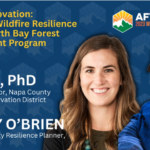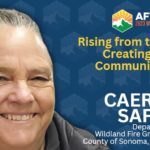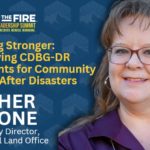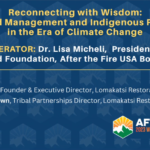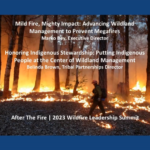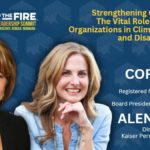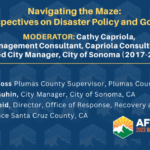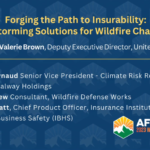Posts by leng123
Day 2-14: Piloting Innovation: Advancing Wildfire Resilience with the North Bay Forest Improvement Program | Dr. Lucas Patzek & Molly Curley O’Brien
The North Bay Forest Improvement Program is a regional financial and technical assistance program for non-industrial small-scale private landowners in Napa, Sonoma, Mendocino, and Lake Counties in Northern California. It provides planning expertise and funding to help landowners reduce wildfire risks on their forested properties through fuel management projects like vegetation thinning and prescribed burns.…
Read MoreDay 2-13: Rising From the Ashes: Creating Resilient Communities Post MegaFire | Caerleon Safford
The sheer devastation caused by mega-fires amplifies the urgency to address not only the immediate aftermath but also the long-term consequences on the affected communities. However, rebuilding these communities to be resilient requires addressing numerous complex factors that require a strategic and diligent approach rooted in comprehensive research, a thorough understanding of the local context,…
Read MoreDay 2-12: Rebuilding Stronger: Demystifying CDBG-DR Block Grants for Community Recovery After Disasters | Heather Lagrone
In the aftermath of a disaster, it is crucial to swiftly assess the extent of the damage and the immediate needs of the affected community. Whether it’s allocating funds for infrastructure repairs, emergency services, or restoring essential utilities, a well-executed recovery plan is essential. The Community Development Block Grant Disaster Recovery (CDBG-DR) program is a…
Read MoreDay 2-11: Reconnecting with Wisdom: Wildland Management and Indigenous Practices in the Era of Climate Change | Dr. Lisa Mitcheli (Moderator), Marco Bey (Panelist) & Belinda Brown (Panelist)
The integration of Western science and traditional indigenous knowledge represents a powerful approach to fostering healthier landscapes and resilient communities in the face of escalating fire risks. Western science contributes data-driven analysis, cutting-edge technology, and quantitative modeling, while traditional indigenous knowledge offers profound insights derived from centuries of adaptive land management practices and deep connections…
Read MoreDay 2-10: Mild Fire Mighty Impact: Advancing Wildland Management to Prevent Megafires | Marco Bey Honoring Indigenous Stewardship: Putting Indigenous People at the Center of Wildland Management | Belinda Brown
Indigenous communities have lived sustainably on the land for generations, developing a deep understanding of the ecosystems they inhabit. Their knowledge of fire behavior, coupled with their intimate understanding of the local landscape, creates a powerful tool for wildfire prevention. By recognizing the time-honored wisdom they possess, we can advance our strategies for preventing mega-fires. …
Read MoreDay 2-9: Strengthening Communities: The Vital Role of Healthcare Organizations in Climate Resilience and Disaster Recovery | Judy Coffey & Alena Wall
With the increasing frequency and intensity of climate-related disasters, healthcare organizations are faced with tremendous responsibility beyond just safeguarding public health. They are the backbone of a community’s response and recovery efforts. Their expertise, authority, and resources are vital in ensuring the overall health and well-being of communities impacted by calamities. But more than these,…
Read MoreDay 2-8: Navigating the Maze: Local Perspectives on Disaster Policy and Governance | Cathy Capriola (Moderator), Kevin Goss (Panelist), David Guhin (Panelist), & Dave Reid (Panelist)
Effective disaster policy and governance structures are instrumental in coordinating response efforts, mitigating future risks, and providing relief to affected communities. By implementing comprehensive disaster management strategies and fostering collaboration among various stakeholders, policymakers and governing bodies can proactively address the multifaceted issues posed by disasters. Moreover, by continuously evaluating and adapting policies, these structures…
Read MoreDay 2-7: Forging the Path to Insurability: Brainstorming Solutions for Wildfire Challenges | Valerie Brown (Moderator), Louis Reynaud (Panelist), David Shew (Panelist), & Alister Watt (Panelist)
Insurability is a critical factor to consider when addressing the growing challenges posed by wildfires. As we strive to protect our communities and safeguard our assets, it is necessary to develop new strategies that enhance our ability to manage, mitigate, and recover from these devastating events financially. This discussion is conducted by Valerie Brown, the…
Read MoreDay 2-6: Fannie Mae and Post-Disaster Development of Affordable Housing: Case Study | Sidra Goldwater & Seana O’Shaughnessy
Post-disaster development of affordable housing is a crucial aspect of rebuilding communities and ensuring their long-term resilience. This involves collaborating with government agencies, non-profit organizations, and private stakeholders to develop innovative and sustainable solutions. Get in on the conversation as Sidra Goldwater, a Disaster Recovery & Rebuilding Advisor for Fannie Mae, and Seana O’Shaughnessy, the…
Read MoreDay 2-5: Beyond the Norm: Fannie Mae’s Alignment with Frontline Communities in Driving Resiliency | Sidra Goldwater
Fannie Mae is a government-sponsored enterprise that works to facilitate affordable housing in the United States. It purchases mortgages from lenders, bundles them into mortgage-backed securities, and sells them to investors. This replenishes lenders’ cash so they can originate new mortgages and helps create homeownership and rental opportunities for millions of Americans. Fannie Mae aims…
Read More
